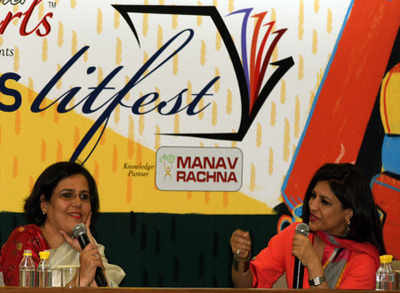- News
- The consequences of Partition are still unspooling before us: Rakshanda Jalil
This story is from November 26, 2016
The consequences of Partition are still unspooling before us: Rakshanda Jalil
The gore and tragedy of 1947 was not the subject of Pakistani writer Intizar Husain’s novels or short stories.

<p>The consequences of Partitioin are still unspooling before us: Rakshanda Jalil<br></p><p><br></p>
The gore and tragedy of 1947 was not the subject of Pakistani writer Intizar Husain’s novels or short stories. He dwelt on the ordinariness, the displacement and nostalgia experienced by those who moved from where they were rooted to a new land, said Rakshanda Jalil, author, literary historian and translator of Husain’s ‘The Sea Lies Ahead’.
‘Hijrat’, the word used to describe the migration of the first Muslims from Mecca to Medina in 622 AD, is a word Husain gave new meaning to – he used it in the context of the movement of people in the Indian subcontinent, after Partition.Jalil was in conversation with Shazia Ilmi at the Times Literary Festival on Saturday.
Jalil used the phrase often used to describe the novels of Jane Austen – “a half-inch square of ivory, finely carved” to describe Husain’s work. Husain, who passed away in February this year, was a chronicler of the ordinary, recording the nostalgia of those who moved across the newly formed nations of 1947.
Jalil described one short story, in which an old woman describes her dreams. A graphic image is of a shoot-out at a mosque that leaves her young grandson dead. Husain had moved from western UP to Pakistan, living first in Karachi and then Lahore. Jalil said she had met him in his Lahore home, and he was even surprised that a one as great as Ghalib was never interviewed but someone had arrived from India to speak with him!
In Husain’s work, we see officials in a newly formed Pakistan remembering with nostalgia their well-equipped offices back in Delhi, sad that they often had to carry their own stationery into workplaces in the newly established country.
Ilmi read out from the English translation of the book, and members of the audience expressed a desire to hear the passage in the original Urdu – that, unfortunately was not possible. The panelists had not carried the text in original.
Both speakers dwelt on the continuing relevance of Husain’s works – as soon as a city is settled, the decline begins, the author tells us, Jalil said, emphasizing the inevitability of decline. “The consequences of Partitioin are still unspooling before us. And the more things change, the more they remain the same.”
‘Hijrat’, the word used to describe the migration of the first Muslims from Mecca to Medina in 622 AD, is a word Husain gave new meaning to – he used it in the context of the movement of people in the Indian subcontinent, after Partition.Jalil was in conversation with Shazia Ilmi at the Times Literary Festival on Saturday.
Jalil used the phrase often used to describe the novels of Jane Austen – “a half-inch square of ivory, finely carved” to describe Husain’s work. Husain, who passed away in February this year, was a chronicler of the ordinary, recording the nostalgia of those who moved across the newly formed nations of 1947.
Jalil described one short story, in which an old woman describes her dreams. A graphic image is of a shoot-out at a mosque that leaves her young grandson dead. Husain had moved from western UP to Pakistan, living first in Karachi and then Lahore. Jalil said she had met him in his Lahore home, and he was even surprised that a one as great as Ghalib was never interviewed but someone had arrived from India to speak with him!
Jalil spoke of how Husain seldom took a political stance, except when he boldly spoke in favour of Bangladesh. The nostalgic imagination makes a bigger and grander image of what is remembered, she says, pointing to how a rabari made in a particular shop in Meerut, not so well known within India, might be remembered as something quite unique by a Mohajir longing for it. Husain was Shia himself, so with a unique insight into the position of minorities. Ilmi spoke of how Pakistan had become majority-Muslim, and how there was need after Partition to examine again how it treated its own minorities.
In Husain’s work, we see officials in a newly formed Pakistan remembering with nostalgia their well-equipped offices back in Delhi, sad that they often had to carry their own stationery into workplaces in the newly established country.
Ilmi read out from the English translation of the book, and members of the audience expressed a desire to hear the passage in the original Urdu – that, unfortunately was not possible. The panelists had not carried the text in original.
Both speakers dwelt on the continuing relevance of Husain’s works – as soon as a city is settled, the decline begins, the author tells us, Jalil said, emphasizing the inevitability of decline. “The consequences of Partitioin are still unspooling before us. And the more things change, the more they remain the same.”
End of Article
FOLLOW US ON SOCIAL MEDIA
